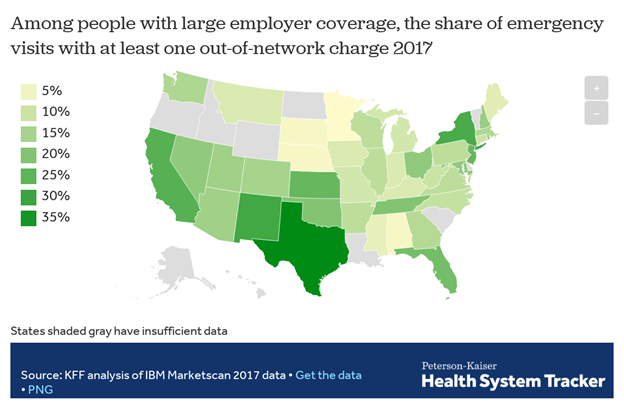|
Just Released
|
||
|
About 1 in 6 Emergency Visits and
Hospital Stays Had At Least One Out-of-Network Charge in 2017
Analysis Also Finds That the Risk of Getting a
Surprise Medical Bill is Much Greater in Some States
In roughly 1 of every 6 emergency room visits and
inpatient hospital stays in 2017, patients came home with at least one
out-of-network medical bill, a new KFF analysis finds.
More specifically, 18 percent of all emergency
visits and 16 percent of in-network hospital stays had at least one
out-of-network charge, leaving patients at risk for surprise medical bills,
according to the analysis of claims data from large employer plans. The
analysis also finds the incidence of such charges varied greatly by state,
for both emergency visits and hospital stays. For instance, emergency care
visits were more likely to result in at least one out-of-network charge in
Texas, New Mexico, New York, California and Kansas, and less likely in
Minnesota, South Dakota, Nebraska, Alabama and Mississippi.
The findings come at a time when policymakers of
both major political parties in Washington have vowed to pass legislation to
protect consumers against surprise medical bills. At the same time, more than
a dozen states have enacted or implemented comprehensive laws to combat the
problem for people enrolled in state-regulated plans. Due to limits imposed
by federal law, it remains the case that people with large employer coverage
generally are not protected by state surprise billing laws if their plan is
self-insured. The analysis summarizes key provisions in states’ laws and
describes the major features of bipartisan federal legislation under
consideration in the House and Senate.
Surprise medical bills generally arise in two
forms. In one, the patient is required to pay a greater share of costs under
her health plan because the medical services performed were out-of-network.
In the other, an out-of-network physician or other provider “balance bills”
the patient in an attempt to collect the difference between the amount the
provider charged for services and the amount the health plan was willing to
pay. Surprise bills are the result of situations beyond a patient’s control,
such as emergency care or treatment by an out-of-network provider at an
in-network facility. Most of the potential surprise out-of-network emergency
charges observed in this study were from doctors and other out-of-network
professionals, rather than from the hospital or emergency facility. Due
to limitations in the available data, KFF researchers were not able to
estimate the dollar amounts of surprise bills.
KFF polling has shown that two-thirds of Americans
says they are either “very worried” (38%) or “somewhat worried” (29%) about
being able to afford their own or a family member’s unexpected medical bills.
More than three quarters of Americans want the federal government to take
action to address surprise bills, though opinion is divided over who should
shoulder the cost – providers, insurers or both.
Filling the need for trusted information on
national health issues, the Kaiser Family Foundation is a
nonprofit organization based in San Francisco, California.
|
||
|
|
||
To be a Medicare Agent's source of information on topics affecting the agent and their business, and most importantly, their clientele, is the intention of this site. Sourced from various means rooted in the health insurance industry - insurance carriers, governmental agencies, and industry news agencies, this is aimed as a resource of varying viewpoints to spark critical thought and discussion. We welcome your contributions.
Thursday, June 20, 2019
About 1 in 6 Emergency Visits and Hospital Stays Had At Least One Out-of-Network Charge in 2017
Subscribe to:
Post Comments (Atom)


No comments:
Post a Comment